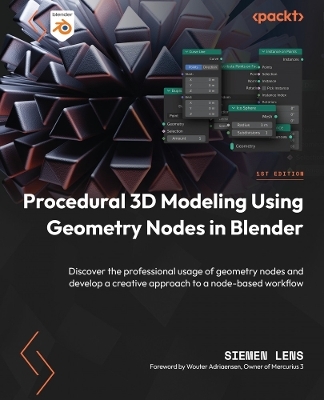
Procedural 3D Modeling Using Geometry Nodes in Blender
Packt Publishing Limited (Verlag)
978-1-80461-255-2 (ISBN)
Purchase of the print or Kindle book includes a free PDF eBook
Key Features
Develop a creative mathematical thinking of the modeling workflow
Understand how Blender and geometry nodes store and manage the data that you are handling
Learn different scatter methods and how to use them
Book DescriptionFor anyone working in the computer graphics industry, understanding how to use Blender’s new geometry nodes tools to manipulate and generate 3D geometry in a node-based workflow is an essential skill. In this book, you’ll learn how to use the basic and intermediate features of geometry nodes that are a crucial part of your Blender roadmap.
You’ll start by understanding the different node inputs and outputs followed by the basic nodes you’ll need throughout your geometry nodes projects. The book will show you how the node system works and enable you to put your newfound knowledge to use through exercises that involve modifying curves, meshes, and more. You’ll work on a range of interesting projects such as creating a procedural plant, where you’ll use nodes to generate the intricate details and variations of a plant in a procedural manner, and a spiderweb generator to refine your skills of cleaning up a node tree. Finally, you’ll build a procedural LED panel using geometry nodes to generate the look of an LED panel.
By the end of this book, you’ll be able to overcome any geometry node issue confidently and make complicated geometry node trees exactly how you need them.What you will learn
Discover the different node inputs and outputs that geometry nodes have to offer
Get the hang of the flow of the geometry node system
Understand the common nodes you'll be using along with their functions in the geometry node editor
Modify basic mesh primitives using the node system inside Blender
Scatter and modify objects aligned onto a curve
Become familiar with the more advanced nodes in the geometry nodes system
Link geometry and material nodes editors using named attributes
Implement your new-found knowledge of nodes in real-world projects
Who this book is forIf you are a CG Artist or follow modeling careers like that of an environment artist or even a CG generalist in the cinematography industry and you are looking to get into learning a node-based modeling workflow using Geometry Nodes in Blender, this is the perfect book for you. You will need a basic knowledge of the fundamentals of Blender, for example, knowing the specific workflow of material nodes and being able to apply this knowledge to your projects. To get the most out of this book, you should have a basic understanding of Blender's shortcut system and some modeling experience.
Siemen Lens is a CG Artist who excels at photorealism. He studies Multimedia in Antwerp. His specialty is to create abstract yet photorealistic renders using Geometry Nodes, Physics, Texturing, and various other techniques in Blender. He also uses other software like After Effects, Illustrator, and Vegas Pro. Siemen has worked as a product render designer in a Furniture company. He has also worked at PartydoosMedia, a Dutch digital graphic design agency. His goal is to create visually convincing CG Art that is pleasing to the eye. With this book, he aims to get you well versed with Geometry Nodes.
Table of Contents
An Introduction to Geometry Nodes
Understanding the Functionalities of Basic Nodes
Must-Have Add-Ons for Building Node Trees
Making Use of Node Primitives
Distributing Instances onto a Mesh
Working with the Spreadsheet in Blender
Creating and Modifying Text in the Geometry Node Editor
Editing Curves with Nodes
Manipulating a Mesh Using Geometry Nodes
Creating a Procedural Plant Generator
Creating a Procedural Spiderweb Generator
Constructing a Procedural LED Panel
Tips and Tricks for the Geometry Node Editor
Troubleshooting the Most Common Problems in Geometry Nodes
| Erscheinungsdatum | 20.03.2023 |
|---|---|
| Vorwort | Wouter Adriaensen |
| Verlagsort | Birmingham |
| Sprache | englisch |
| Maße | 191 x 235 mm |
| Themenwelt | Mathematik / Informatik ► Informatik ► Web / Internet |
| ISBN-10 | 1-80461-255-3 / 1804612553 |
| ISBN-13 | 978-1-80461-255-2 / 9781804612552 |
| Zustand | Neuware |
| Informationen gemäß Produktsicherheitsverordnung (GPSR) | |
| Haben Sie eine Frage zum Produkt? |
aus dem Bereich


